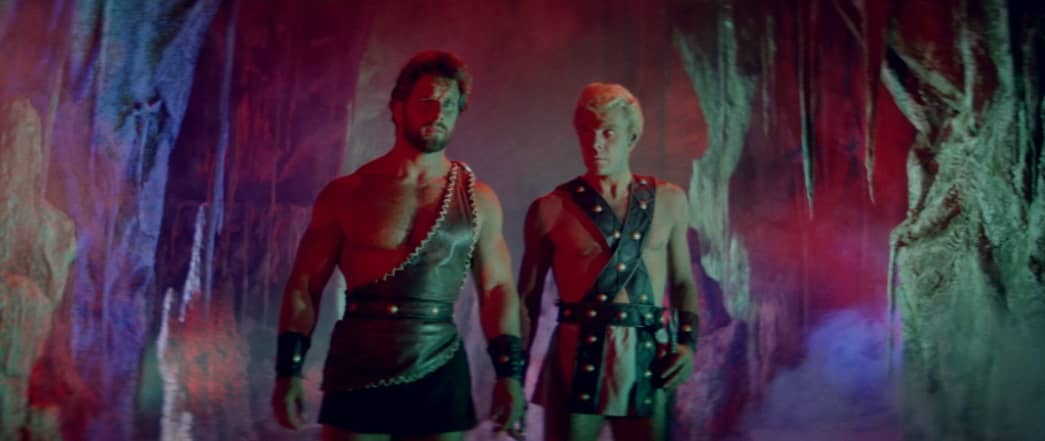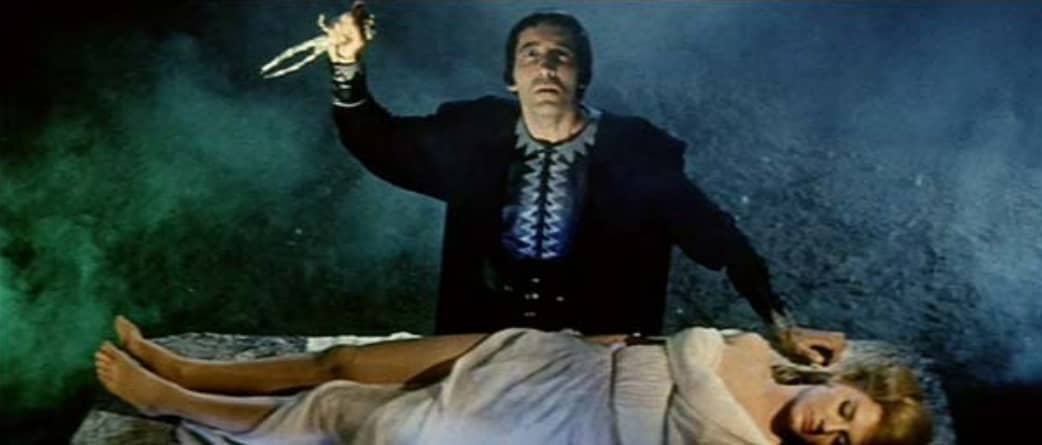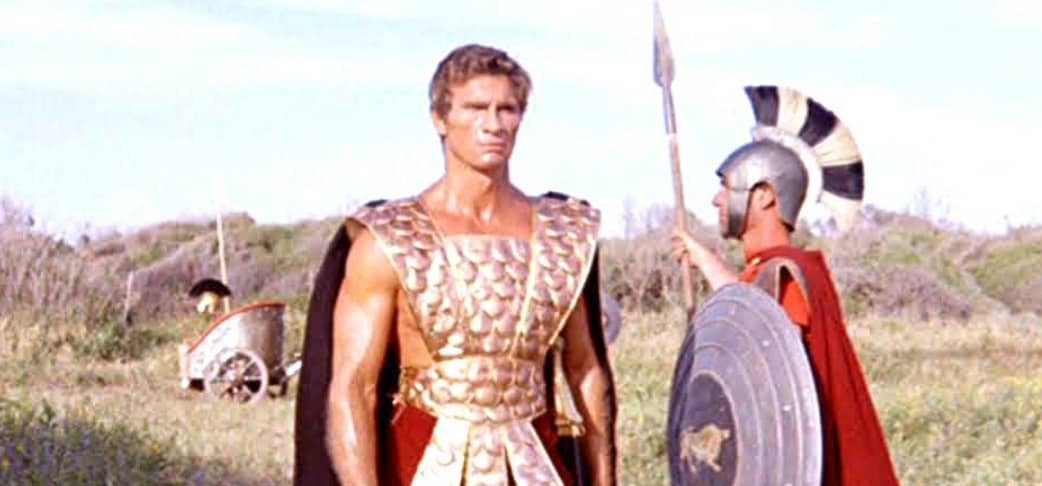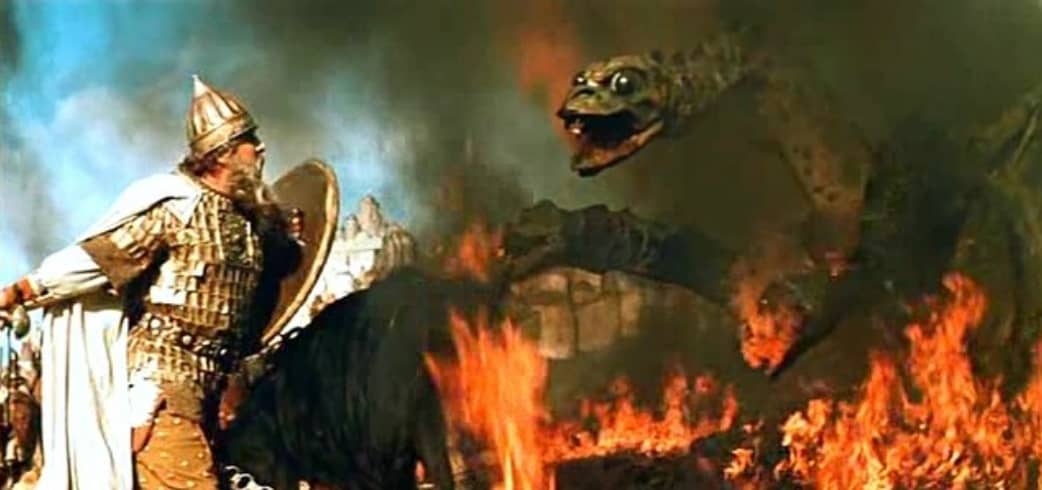Ellsworth’s Cinema of Swords: Forgotten Fantasies
Hercules in the Haunted World (Italy, 1961)
During the late Fifties and early Sixties, if you were a fan of films of imagination and the fantastic, though there were plenty of monster movies playing at the drive-in, except for the films of Ray Harryhausen there were very few classical fantasies coming out of Hollywood — and Harryhausen’s movies were mostly British productions. In fact, heroic fantasy films were thin on the ground, being regarded in America as fodder for children. Fortunately, that wasn’t always the case in Europe, where monsters still found themselves opposed by sword-swinging heroes as often as by modern soldiers with bazookas. And occasionally, those films would make it across the Atlantic, though they were usually relegated to double bills with fare such as Reptilicus and The Beast from 20,000 Fathoms.
Hercules in the Haunted World
Rating: **
Origin: Italy, 1961
Director: Mario Bava
Source: YouTube streaming video
Hercules goes to Hell! In most ways this is no better than the average peplum strongman flick: production values are low, the acting is mostly terrible, the plot is a grab-bag of elements from Greek myth flung together at random. And yet, there are reasons to watch it. First, it was directed by Mario Bava, the master of stylish Italian Sixties horror movies, and Bava combines the peplum and horror genres with an easy confidence. Second, it has Christopher Lee, the master Dracula of Hammer Horror films, as the vampiresque main villain, though they did dub his voice for the English version. And third, oh lordy, there’s that monster Procrustes — but we’ll get to him in a minute.
Hercules (Reg Park) is returning from his adventures to Acadia to marry his sweetheart Daianara (Leonora Ruffo) with his buddy, the hero Theseus (George Ardisson), who looks and acts just like a blond, skirt-chasing surfer dude, and his other buddy Telemachus (Franco Giacobini), the requisite goofball comic sidekick. But upon arrival Herc finds that Daianara’s father, the king, has suddenly passed away. However, instead of Daianara assuming the throne it’s been taken by her uncle Lico (Christopher Lee) because the princess is too ill to rule. Herc’s ladylove Dai doesn’t even recognize him, wandering around in a dazed trance that might maybe have something to do with the fact that Lico keeps her at night in a stone coffin in his subterranean shrine to the Gods of Darkness. Just guessing here.
But Herc doesn’t know about that, so he consults with a creepy oracle who tells him Daianara can be saved only by going on a quest to Hades itself! Herc must enter the realm of the god Pluto to obtain the Stone of Forgetfulness, but to get out again he’ll first need to get the Golden Apple from the cursed Garden of the Hesperides. Double MacGuffins? Why not? Let’s go!
Bava conjures up an eerie tone for Hercules’ journey into Hades mostly with nothing more than the brilliant use of lighting and clever lap-dissolves to fade images in and out — it’s cheap, but it works. The story stops making much sense around the time the heroes are shipwrecked on the shore of Hesperides, but Herc picks up the pace with his Mighty Feats of Strength, throwing great boulders as if they were mere painted chunks of foam, plus being nonstop forthright and courageous even when everyone else falters. And just when you’re starting to tire of all those spooky hell-caves, Theseus and Telemachus get captured by the monster Procrustes, who is worth the price of admission: a tall stone man in a heavy stalactite suit, he laughs real slow, “Ha. Ha. Ha,” ties Telemachus to a too-short stone bed, and rumbles, “You. Should be. Shorter. I will. Make you. Fit the bed.” What a card!
Hercules throws him through a wall.
Anyway, the MacGuffins get got and the heroes return to Acadia, but Christopher Lee isn’t about to surrender to a musclebound lug like Reg Park: he abducts Daianara, carrying her in a white, gauzy dress to his underground lair where the Gods of Darkness have commanded him to do unspeakable things. Herc pursues, fighting hordes of zombies, and during a lurid lunar eclipse finally catches up to them at an altar surrounded by standing stones. But if there’s one thing Hercules knows what to do with, it’s really big stones. Sorry, Lico.
Fury of Achilles
Rating: ***
Origin: Italy, 1962
Director: Marino Girolami
Source: YouTube streaming video
If you’re interested in Greek warfare of the classical period, you might want to read Homer’s Iliad, the story of the end of the Trojan War. (Your editor recommends the recent translation by Caroline Alexander.) But if 500 pages of Hellenic proper names doesn’t sound appealing, as an alternative you could do worse than to watch Fury of Achilles.
This Italian sword-and-sandal mini-epic may have a modest budget and a few wooden actors, but it hews closer to the source material than most mid-century Trojan War movies, featuring divine magic and active meddling by the gods, which technically makes it a fantasy rather than a historical war story. Focusing on Achilles (Gordon Mitchell), this tells the tale of the tenth year of the war from the Greek perspective, with solid portrayals of movers and shakers such as King Agamemnon (Mario Petri), Ulysses (Piero Lulli), and Achilles’ best bud Patroclus (Ennio Girolami). The Trojans get comparatively short shrift, with a spotlight only on the noble Hector (Jacques Bergerac).
However, this is an action film rather than a political thriller, with the mighty Gordon Mitchell front and center. The man looks like a marble statue of a Greek warrior come to life, radiating a compelling screen presence that makes up for his limited emotional range. With the Greeks short on provisions, Achilles with Agamemnon and Ulysses goes raiding in the Trojan back country, conquering a small city and claiming its aristocratic daughters as their personal slaves. Against all the omens, Agamemnon chooses as his prize Chryseis (Eleonora Bianchi), a priestess of Apollo, while Achilles takes the sullen-but-gorgeous Briseis (Gloria Milland) back to his tent. Achilles washes off the blood and comes around for lovemaking, but Briseis is defiant and tries to stick a dagger into him — and the blade melts because Achilles, of course, is a son of the goddess Thetis and 98% divinely invulnerable. However, he knows he is fated by prophecy to die before the walls of Troy, but rather than struggle against fate he accepts that he is doomed. Briseis thinks that’s hot, and they snog.
Agamemnon isn’t so lucky with Chryseis, as Apollo, offended, smites the Greek army with a tempest and a nine-day plague. To end the smiting, the king gives up Chryseis, but he demands Briseis from Achilles as compensation, and that’s where things start to go wrong. Achilles pulls himself and his Myrmidons out of the siege, Hector and his Trojans counterattack the weakened Greek forces, and Patroclus makes the fatal decision to don Achilles’ armor and fight Hector in his place. This begins the last of the film’s three big battle sequences, which is where Fury of Achilles really shines.
With a limited number of troops onscreen, by clever staging director Girolami nonetheless manages to give the impression of titanic battles, and unlike most Italian historicals the combat is top-notch, with the extras fired up and working at it. The single combats are all tense and suspenseful, and the final duel between Achilles and Hector is one of the best short-sword bouts on film. Kudos to stunt coordinator Remo De Angelis for the dynamic action.
Bonus: with a slight overlap, this film ends where Steve Reeves’ The Trojan Horse (1961) starts. Watch ‘em both.
The Sword and the Dragon (or Ilya Muromets or The Epic Hero and the Beast)
Rating: ***
Origin: Russia, 1956 / UK, 1960 / USA, 1963
Director: Aleksandr Ptushko
Source: YouTube streaming video
The bogatyrs were legendary culture heroes of the Kievan Rus, precursors of the later Russian Empire that was centered on Muscovy. One of the mightiest of the bogatyrs was Ilya Muromets, who was said to fight the Mongol invaders with superhuman strength and a magic sword; the old epic poem about Muromets was revived in the 19th century, and in 20th the bogatyr was adopted as a proto-patriot of the fatherland by Soviet Russia. That made his larger-than-life adventures a perfect subject for Russia’s leading filmmaker of the fantastic, Aleksandr Ptushko, who made the colorful fable Ilya Muromets in 1956.
With the growing popularity of Harryhausen-style fantasies, in 1960 the film was issued in an English-language version in the UK as The Epic Hero and the Beast, and then redubbed and reissued by American producer Roger Corman in 1963 as The Sword and the Dragon. The Corman version is what’s usually seen today, though there’s a cleaner Russian version restored by Mosfilm that has decent English subtitles.
This film is an epic fantasy with big medieval battles, colossal sets, extravagant costuming, sorcery, demons, and a three-headed fire-breathing dragon. It’s also so simple it’s almost a child’s fairy tale, which is how it was marketed by Corman, and like much Soviet art it’s as subtle as a sledgehammer. The Mongols, called Tugars in the film, are dreadful barbarians, all bad habits and bad hygiene, and Muromets (Boris Andreyev) is a gigantic hero of goodness whose only flaw is that he’s a wee bit short-tempered. But at the start, Ilya is a mere farmer stricken with paralysis who can’t even raise his arms to fight when the Tugars raid his village and carry off his beloved Vilya (Ninel Myshkova).
Meanwhile, a giant bogatyr, called Invincor in the Corman version, wearies of fighting and passes on, metamorphosing into a mountain of rock, but not before giving his magic sword to some pilgrims and charging them with finding a hero who will wield it for the cause of good. The pilgrims find Muromets, cure him with a magic potion, give him Invincor’s sword, and it’s look out, Tugars! He raises up a magical horse called Chestnut Gray, declaiming, “Serve me well, noble steed!” (All his lines are like that.) Advised by talking ravens, Muromets captures a hideous wind demon, impresses Prince Vander of Kiev, and when an arrogant half-ton Tugar envoy, borne on the backs of slaves, appears at the gates to make demands of the noble prince, Muromets kills him outright.
The depiction of the Tugars here is both fabulous and disturbing. Brutal caricatures of Central Asians, they’re all cruel slaves of their even crueler Khan (Shukur Burkhanov), who does stuff like command hundreds of his minions to pile into a human pyramid so he can climb to the top to get a better view. The Tugars’ fantastic outfits and vile practices are outsized, outrageous, and appallingly racist on an epic scale. Hundreds of them come sweeping across the steppe for the final battle with Muromets and his proto-Ukrainians, for a climax that features the aforementioned dragon, a mix of stop-motion animation and a giant puppet whose heads are mounted with actual military flamethrowers. Quite a spectacle, all in all. Just don’t hope for subtlety.
Where can I watch these movies? I’m glad you asked! Many movies and TV shows are available on disk in DVD or Blu-ray formats, but nowadays we live in a new world of streaming services, more every month it seems. However, it can be hard to find what content will stream in your location, since the market is evolving and global services are a patchwork quilt of rights and availability. I recommend JustWatch.com, a search engine that scans streaming services to find the title of your choice. Give it a try. And if you have a better alternative, let us know.
Previous installments in the Cinema of Swords include:
Warmongers
Fables and Fairy Tales
Goofballs in Harem Pants, Part 2
Timey-Wimey Swordy-Boardy
Boy-Toys of Troy
Piracy – Two Wrecks and a Prize Ship
Postwar in the Greenwood
The Barbarian Boom, Part 4
Blood-Red and Blind: The Crimson Bat
Updating the Classics
Sink Me! Scarlet Pimpernels!
The Barbarian Boom, Part 5
Alexandre/Alexander
Musashi and Kojiro
LAWRENCE ELLSWORTH is deep in his current mega-project, editing and translating new, contemporary English editions of all the works in Alexandre Dumas’s Musketeers Cycle, with the fifth volume, Between Two Kings, available now from Pegasus Books in the US and UK. His website is Swashbucklingadventure.net.
Ellsworth’s secret identity is game designer LAWRENCE SCHICK, who’s been designing role-playing games since the 1970s. He now lives in Dublin, Ireland, where he’s writing Dungeons & Dragons scenarios for Larian Studios’ Baldur’s Gate 3.




By happy coincidence, Ilya Muromets is going to be coming out on Blu-ray later this month.
Excellent!
Another Ellsworth’s Cinema of Swords? Bravo!
A pleasure, as always. I THINK I may have seen the Fury of Achilles, but the other two films are new to me. Thank you again, sir, for pointing me towards (possible) treasures I would otherwise be ignorant of.